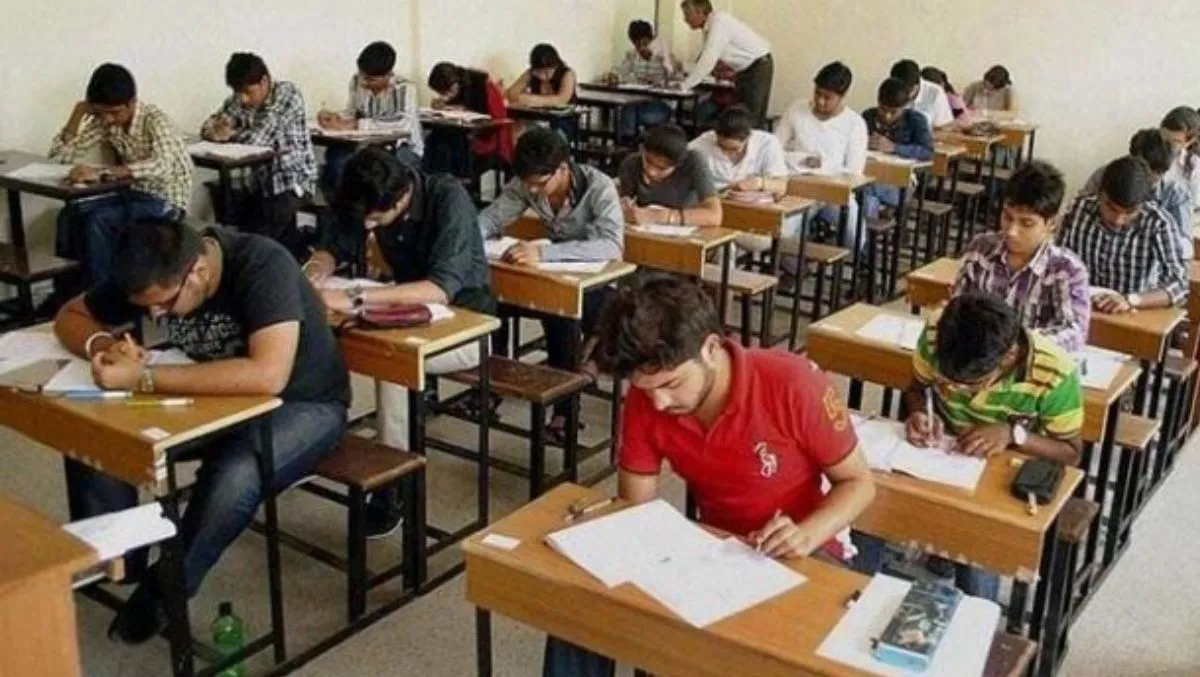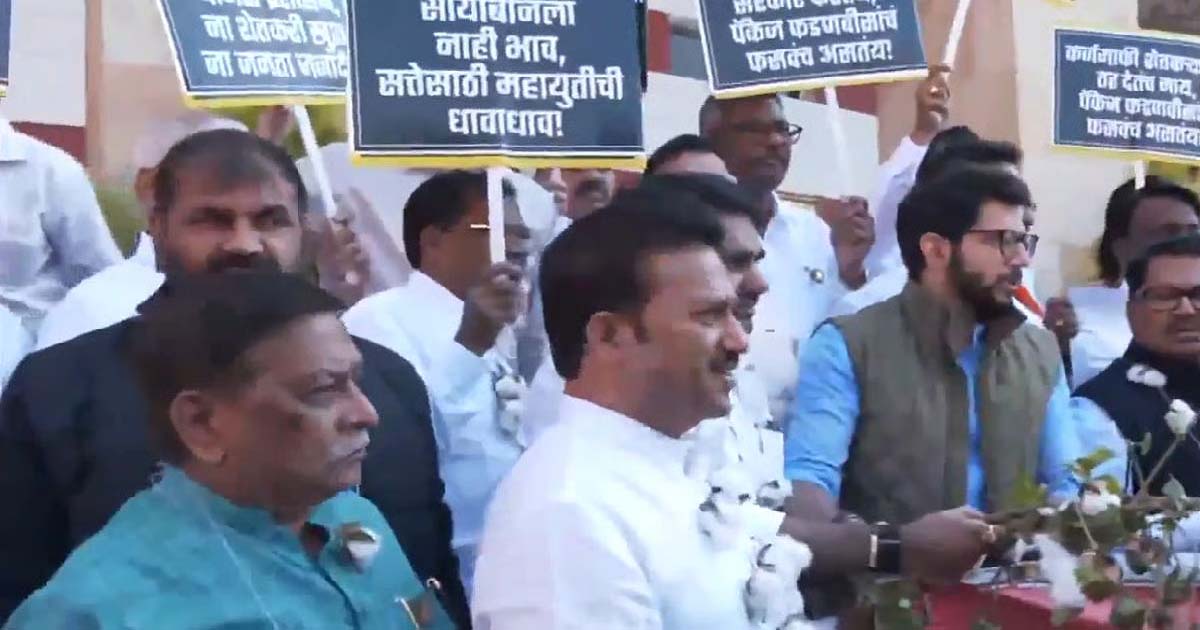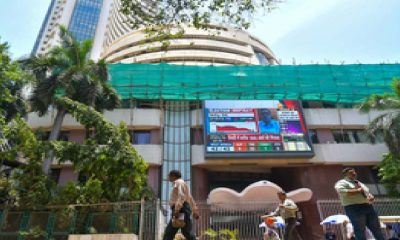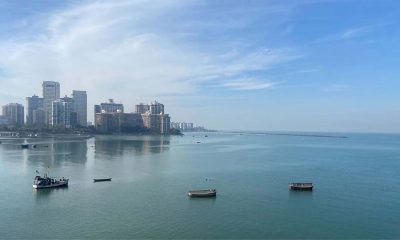Maharashtra
Mumbai: Writing challenge for students as Maharashtra SSC Board exams return to pre-Covid norms

Mumbai: As the class 10 secondary school certificate (SSC) examinations return to the pre-Covid norms, city schools are faced with a distinct challenge: getting students to write for three hours at a stretch.
While studies like the Annual Status of Education Report (ASER) 2022 have documented the decline in reading and maths levels of school-going children during the pandemic, the schools also found them to be severely lacking in writing – a key skill for the state board’s pen-and-paper subjective tests for class 10. With the Maharashtra State Board of Secondary and Higher Secondary Examination (MSBSHSE) withdrawing all the concessions given last year, including a home centre for exams, reduced syllabus and additional time, finishing the papers on time has become a daunting task for many, said the teachers.
Less than adequate writing practice a hurdle
According to school heads, most of the students didn’t get sufficient writing practice when schools switched from physical classrooms to digital modes of teaching for almost two years since Covid broke out in March 2020. “The biggest challenge we are facing is that the students are not able to write and complete the paper on time. Their writing process has gone for a toss… Many of them get tired after writing for an hour or so,” said Sangeeta Srivastava, Principal of The Kandivli Education Society’s SVPV Vidyalaya, Kandivali. “Everyone is good at typing, but they give up when asked to write,” she added.
Anjuman-I-Islam’s Allana English High School at Fort is also grappling with this issue. “The students didn’t get much writing practice when the school was shut, as there were no notebooks to be filled,” said Rizwana Satare, Principal of the school.
New measures in place for SSC Board Exams 2023
To make matters more difficult, the state board on Saturday announced doing away with the practice of giving question papers to students 10 minutes before the exam time. “Those 10 minutes were very precious and we had taught students how to take advantage of them. But we are now calling them back to school during their preparatory leave to brief them about this new development,” said Srivastava.
The schools are taking several measures to ensure that the students are adequately trained in writing before they enter the exam halls for their first-ever board test on March 2. While most schools are conducting extensive mock tests, some held special workshops and classes to improve writing skills.
“Post-Covid our students’ writing speed has slowed down to a great extent. Hence, we organised workshops where they were assigned writing practice. We also encourage them to write as many past papers at home as possible, even if that means copying answers from textbooks. This way, they will not learn their answers, but will also improve their pace and stamina of writing,” said Sudhir Ghagas, Head Master, Padmashri Annasaheb Jadhav Vidyalaya, Bhiwandi.
The BrihanMumbai Municipal Corporation (BMC)-run Tilak Nagar Hindi School in Chembur has carried out multiple mock tests. “Students need to practice as they have lost their habit of writing during the past 2-3 years,” said the school Principal Gulabdas Achutra.
Maharashtra
Maharashtra: Opposition Leaders Stage Protest Against State Govt’s Continued Neglect Of Farmers

Nagpur: The second day of the Maharashtra Legislature’s Winter Session on Tuesday saw the opposition staging a forceful protest over what they termed the state government’s “continued neglect” of farmers.
Accusing the MahaYuti government of apathy, opposition leaders said that despite repeated assurances, the situation on the ground has worsened, with farmer suicides reportedly averaging eight per day.
Leaders, including Vijay Wadettiwar and Aaditya Thackeray, said the government had “misled” farmers with promises of a comprehensive loan waiver that remains unimplemented.
They also criticised the administration for failing to ensure a fair Minimum Support Price (MSP) for key crops.
The opposition further alleged that the government’s decision to reduce import duty on cotton to zero has triggered a surge in foreign cotton imports, severely hurting domestic growers.
They said soybean procurement centres are yet to start operations this season, adding to farmers’ distress. They also hit out at the government for the delay in disbursing bonus payments for paddy.
Soybean farmers have said that they are compelled to sell their produce in the open market below the MSP level, which hardly covers their costs. This, they say, has deepened their financial crisis in rural households.
Raising slogans such as “Deceitful Government!”, “Waive Farmers’ Loans!” and “Ensure Fair Prices for Cotton and Soybean!”, opposition MLAs accused the government of making announcements without delivering meaningful relief.
They also pointed to rising cases of farmer suicides to argue that the administration lacks seriousness in addressing agrarian distress.
The opposition claimed the government’s lack of urgency became evident when the Union Agriculture Minister recently stated that the Centre had not yet received any proposal for aid for rain- and flood-hit farmers from the state.
The state government later clarified that it had submitted the proposal on November 27.
Maharashtra
Sakri Holi riots: Dhule sessions court acquits ten Muslims including two women in the case, Jamiat Ulema Maharashtra takes legal action against Arshad Madani

Dhule Sessions Court Additional Sessions Judge Jayshree R. Platte acquitted ten accused, including two women, in the Holi riot case that took place at a place called Sakri near Dhule recently due to the complainant and other government witnesses’ deviation from their previous statements. The court acquitted accused Sumiya Zakir Sheikh, Shabana Farooq Sheikh, Meraj Ibrahim Syed, Nasir Sapro Sheikh, Irfan Sapro Sheikh, Mohiuddin Sheikh, Nisar Naseeb Khan Pathan, Samad Saleem Sheikh, Zakir Sapro Sheikh and Saleem Sheikh of serious charges like attempt to murder. The case of the accused was pursued by the Jamiat Ulema Maharashtra (Arshad Madani) Legal Aid Committee on the request of Jamiat Ulema Dhule. Advocate Ashfaq Sheikh appeared in defense of the accused while Advocate NB Kalal followed the prosecution. On March 18, 2022, communal riots broke out in Sakri on the occasion of Holi, after which the police took unilateral action and registered a case against ten Muslims, including two women, under sections 147, 148, 307, 353, 332, 336, 337, 295 of the Indian Penal Code. The police applied Section 4/25 of the Arms Act on the accused and accused them of assault with weapons. Initially, the case was heard in the Sakri Magistrate Court and then the case was transferred to the Dhule Sessions Court because the police had also applied serious sections like 307/ along with the Arms Act on the accused. During the final hearing, Advocate Ashfaq Sheikh told the court that during the trial, the complainant and his wife did not support the police and deviated from their previous statements. Therefore, the accused should be acquitted from the case.
Additional Sessions Judge Jayshree R. Plate of the Dhule Sessions Court said in his decision that the accused cannot be punished on the basis of deviation from the statements of important witnesses and mere suspicion, therefore all the accused are acquitted from the case. On the instructions of President Jamiat Ulema Maharashtra Maulana Haleemullah Qasmi, Mushtaq Sufi (General Secretary, Dhule District) and his colleagues prosecuted the case.
Maharashtra
Thane To Face 30% Water Cut From December 9 After Major Pipeline Break At Kalyan Phata; Check If Your Area Is Affected

Thane, December 9: After Mumbai witnessed a 15 percent water cut earlier this week, residents of Thane are set to face an even steeper reduction in supply. The Thane Municipal Corporation has announced a 30 percent water cut across the city with effect from Tuesday, placing lakhs of citizens under severe water stress.
The major disruption follows a breakdown in the 1000 mm diameter water pipeline that supplies water to Thane from Pise Dam to the Temghar Water Treatment Plant. The pipeline reportedly burst at Kalyan Phata on the morning of Saturday, December 6, during ongoing work being carried out by Mahanagar Gas.
Officials from the water supply department said that repair work has been underway on a war footing for the last two days. However, restoring full supply is expected to take at least three more days as the damaged pipeline is old and made of pre stressed concrete.
Due to the scale of the damage, water supply to Thane has already been significantly reduced. Civic officials stated that the fragile condition of the pipeline has further complicated the repair process.
To ensure that the available water is distributed as evenly as possible, the civic body will now supply water on a zoning basis till December 11. As a result, residents in many areas will experience intermittent water supply and low pressure at different times of the day.
The municipal corporation has advised citizens to store sufficient water for essential use over the next few days and to use water sparingly to avoid further hardship.
The sudden and sharp reduction in water supply is expected to impact daily activities across households, residential societies, eateries and commercial establishments. From cooking and cleaning to drinking water needs, citizens are likely to face significant inconvenience.
Meanwhile, parts of Mumbai also faced an eight hour water cut on Sunday following major pipeline repairs. A 15 percent cut has been implemented there since December 8, affecting supply in 14 sections of the city. However, officials acknowledged that the situation in Thane is more critical due to the higher percentage of reduction across the entire city.
-

 Crime3 years ago
Crime3 years agoClass 10 student jumps to death in Jaipur
-

 Maharashtra1 year ago
Maharashtra1 year agoMumbai Local Train Update: Central Railway’s New Timetable Comes Into Effect; Check Full List Of Revised Timings & Stations
-

 Maharashtra1 year ago
Maharashtra1 year agoMumbai To Go Toll-Free Tonight! Maharashtra Govt Announces Complete Toll Waiver For Light Motor Vehicles At All 5 Entry Points Of City
-

 Maharashtra1 year ago
Maharashtra1 year agoFalse photo of Imtiaz Jaleel’s rally, exposing the fooling conspiracy
-

 National News1 year ago
National News1 year agoMinistry of Railways rolls out Special Drive 4.0 with focus on digitisation, cleanliness, inclusiveness and grievance redressal
-

 Maharashtra1 year ago
Maharashtra1 year agoMaharashtra Elections 2024: Mumbai Metro & BEST Services Extended Till Midnight On Voting Day
-

 National News1 year ago
National News1 year agoJ&K: 4 Jawans Killed, 28 Injured After Bus Carrying BSF Personnel For Poll Duty Falls Into Gorge In Budgam; Terrifying Visuals Surface
-

 Crime1 year ago
Crime1 year agoBaba Siddique Murder: Mumbai Police Unable To Get Lawrence Bishnoi Custody Due To Home Ministry Order, Says Report






















